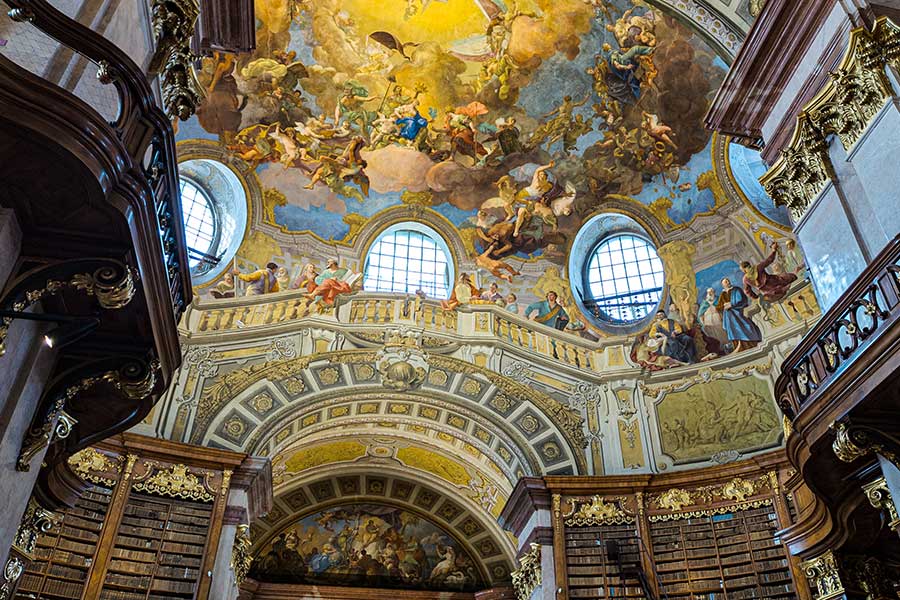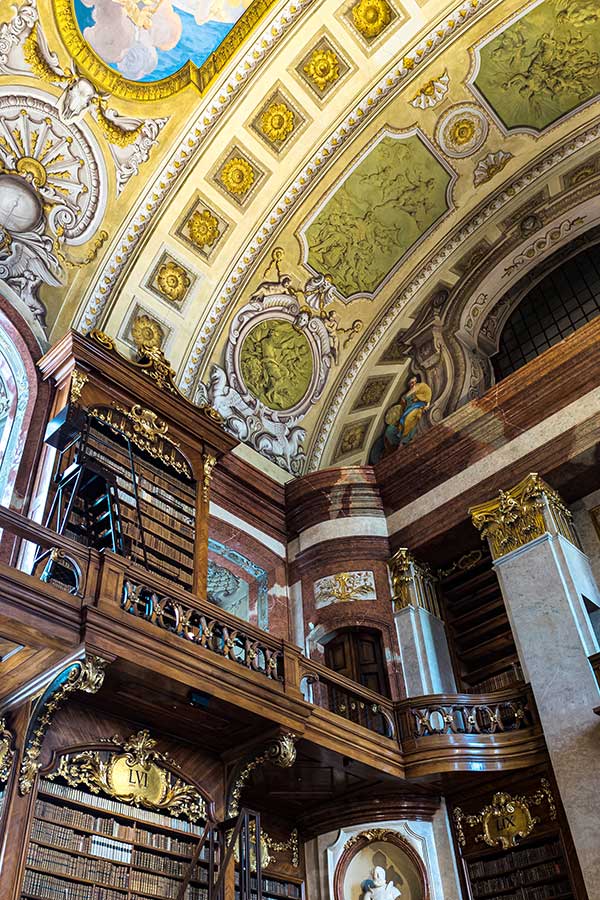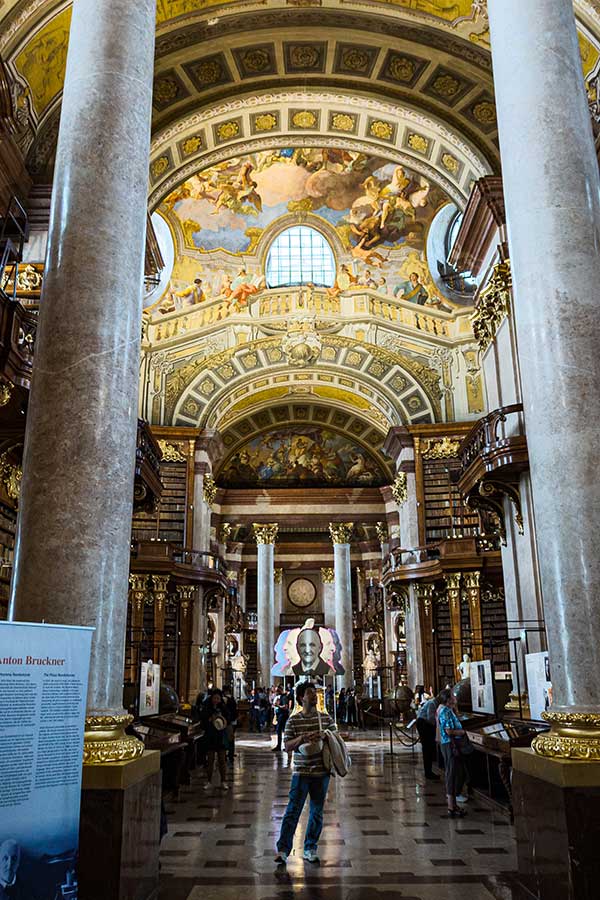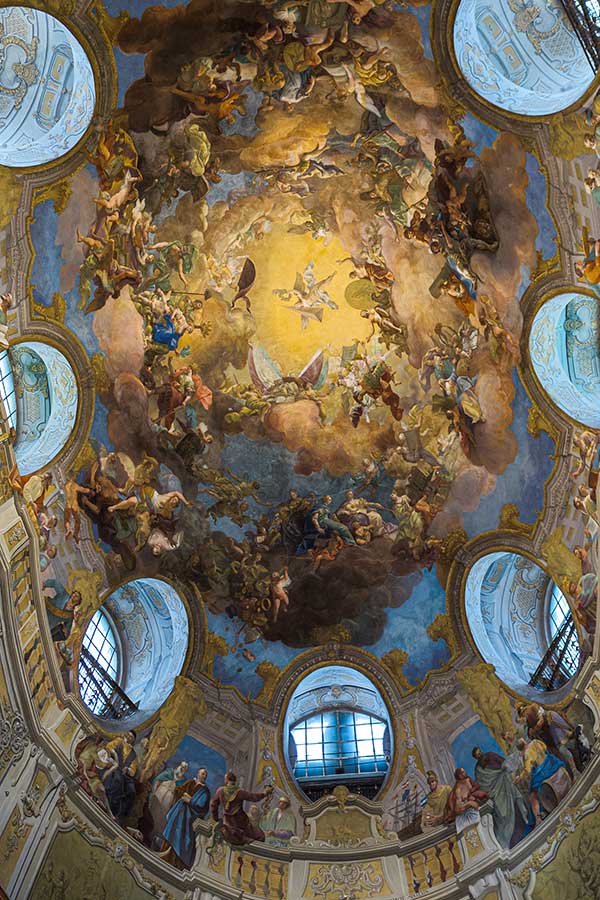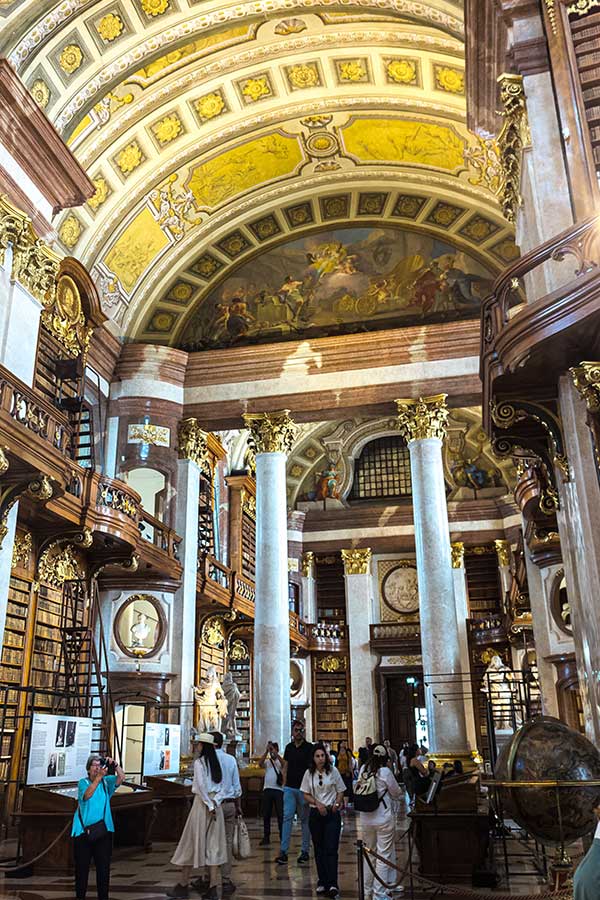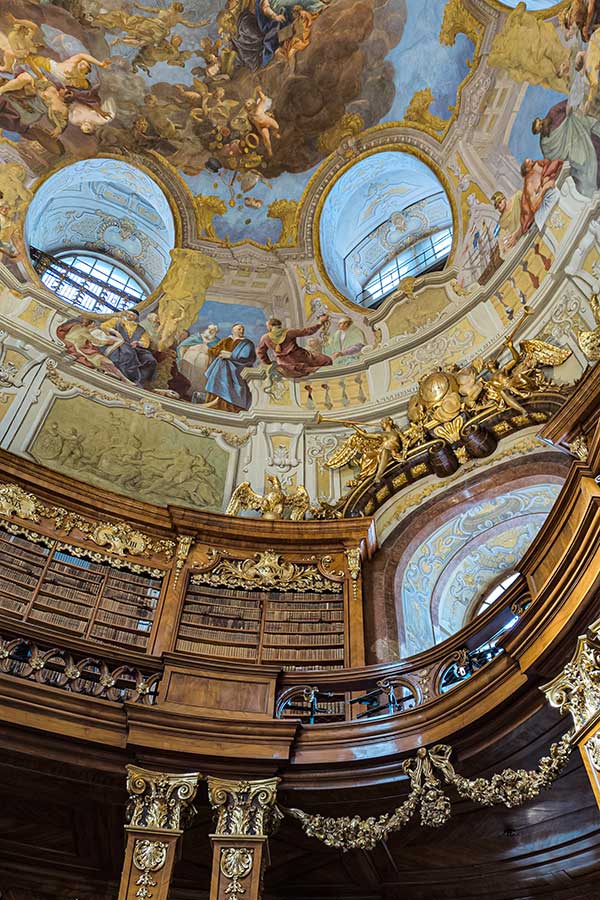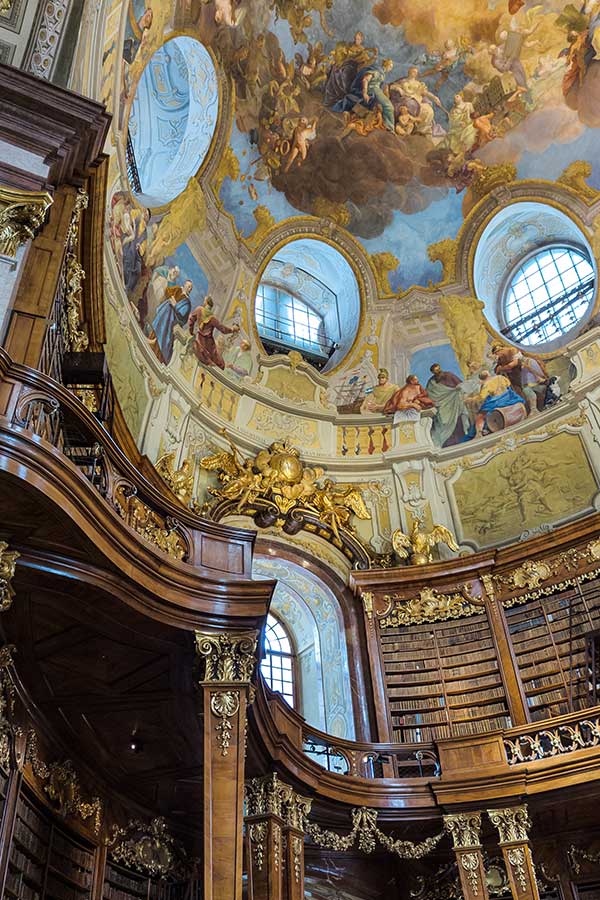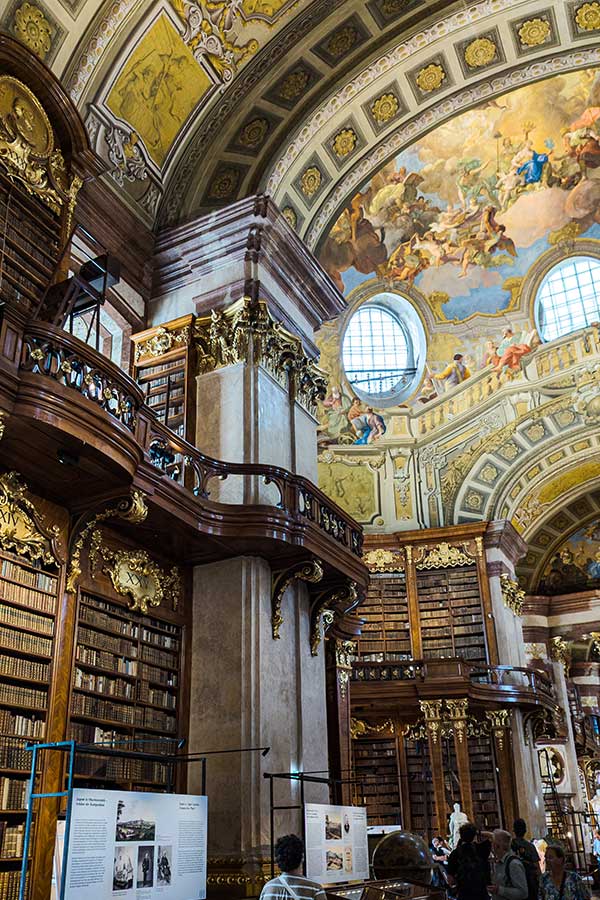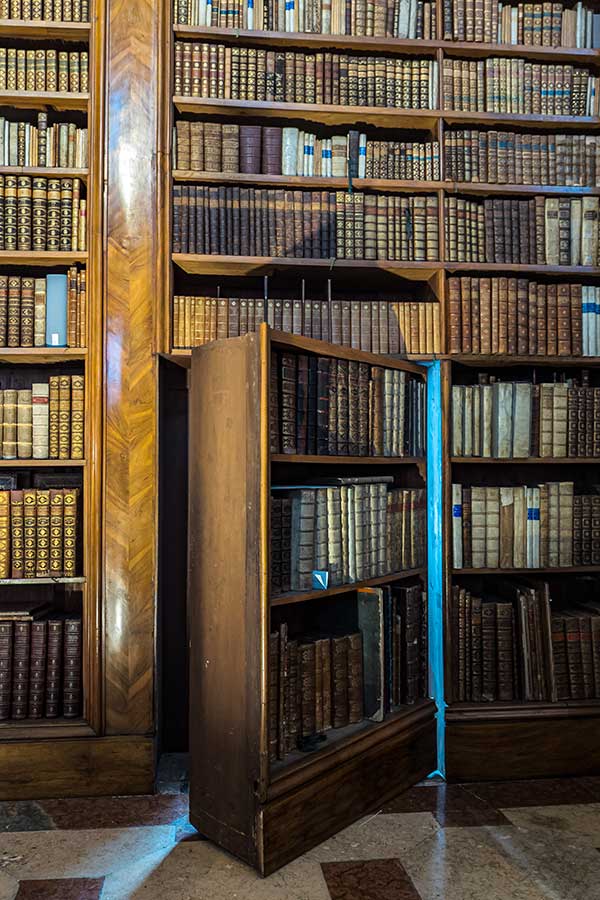Once upon a time, books were a luxury for the privileged minority. Today, with digitization, libraries are slowly disappearing. A select few have become must-see spots with stunning architecture and important history that attract visitors from around the world. Chief among them is the Austrian National Library State Hall, one of the most beautiful places in Vienna, Austria.
Located in a part of Hofburg, the one-time imperial palace, the Austrian National Library State Hall has it all: remarkable frescoes cover the ceiling, including a central dome ringed by windows; rich walnut paneling; and around 200,000 books, some of which are nearly a thousand years old. Walking through the State Hall is magical.
A Brief History of the Austrian National Library
Today, the Austrian National Library in Vienna is the country’s largest library, but it was founded in 1368 as the Imperial Court Library. At that time, Duke Albrecht III wanted to consolidate his riches by moving his extremely valuable books into a central library. The library’s most valuable book dates to that same year: a religious text by Johannes von Troppau featuring gold text and elaborate Bohemian illustrations.
The Habsburg library collection grew with each passing duke or through marriage dowries. In the 16th century, book collectors and scholars significantly increased the number of books in the library, adding nearly 1,000 Greek and Latin manuscripts.
The first official librarian, Dutch scholar Hugo Blotius, was appointed in 1575 by Emperor Maximilian II. At the time, the library was located within a monastery near the palace. Blotius made many valuable contributions to the library. For one, he created an inventory of the collection. He also created a separate inventory itemizing works by the Turks, who were then a major enemy of the Holy Roman Empire. Blotius is also responsible for nearly doubling the number of volumes in the collection, growing it from roughly 7,400 to about 11,000 in just over 30 years.
Prunksaal, State Hall of the Austrian National Library
In 1722, Emperor Charles VI called for the construction of a library using plans initiated by his father, Leopold I. Johann Bernhard Fischer von Erlach, the noted Austrian architect known for his work on Schloss Schönbrunn, began the Baroque hall in 1723. His son, Joseph Emanuel Fischer von Erlach, completed the project three years later. At nearly 263 ft (80 m) long and 66 ft (20 m) high, it would take another four years for the interior to be finished.
Court artist Daniel Gran is responsible for the stunning fresco that covers the 98.5 ft (30 m) high dome, depicting the deification of Charles VI. Lining the hall are a further 16 larger-than-life marble statues of kings, emperors, and dukes, while a further statue of Charles VI, shown with a Herculean air, stands in the center of the hall. There are also four oversized Venetian globes measuring it at over a meter in diameter each!
Add to that 128 walnut bookcases and shelves, 20 doors (including a few hidden ones!), and around 200,000 books from the original collection dating from the 16th to 19th centuries.
It is also worth noting that the library’s prefect from 1777 to 1803, Gottfried van Swieten, developed the first card catalog system for the library.
Visiting the Austrian National Library State Hall
By Vienna’s standards, the entrance to the Austrian National Library State Hall is relatively modest, situated on the rather quiet Josefsplatz. But once inside the building and up the staircase to the State Hall, the word “modest” will be the last one on your mind.
With only a single room, a visit to the State Hall can last as long as you wish. Many seem happy for a quick visit to snap those all-too-necessary photos for social media. Others will stroll through the room, trying to take in every detail—from the beautiful woodwork to the detailed paintings and a peek at the titles on the leather-bound book spines. It is undoubtedly one of the most beautiful places in Vienna.
Several touchscreen monitors in the room allow for a closer look at the artwork on or near the ceilings. With the monitors, you can zoom in and learn about each allegory.
In addition to the historic library itself, there are also specials exhibits setup within the hall that draw from the library’s varied collection.
Tickets to the State Hall can be purchased on-site. For those sightseeing around Vienna, the Vienna Pass or Flexipass might make more sense economically.
Getting There
The Austrian National Library State Hall entrance is tucked away on Josefsplatz. Because of its location in the central part of the city, and since much of the city’s public transit runs in a circle around this area, reaching the library via public transit requires a bit of walking.
The best subway options are the Herrengasse station on the U3 line or the Karlsplatz station on the U1, U2, or U4 lines. (Note: at the time of publishing, the U2 line is temporarily closed for construction. It is expected to reopen in Autumn 2024.) With trams, the Oper station on Kärntner Ring can be reached using lines 1, 2, 71, or D.
For those visiting by car, there is no dedicated parking lot for the library. There are parking lots on the outskirts of this core downtown area where you can park and walk from.
Save this post for later with Pinterest!
All photos and opinions are my own. This post contains affiliate links.
